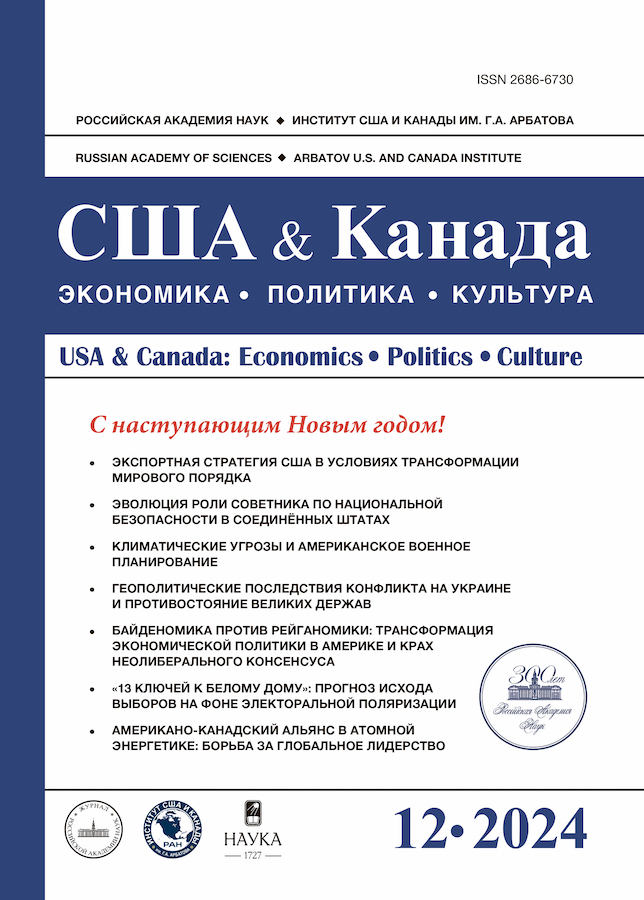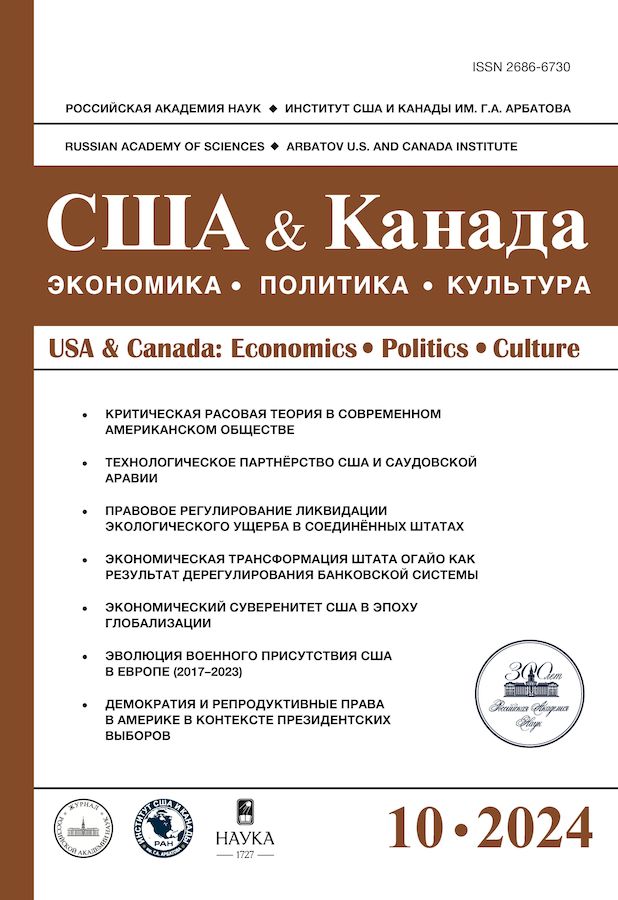Американский экономический суверенитет: основа мирового лидерства США
- Авторы: Пороховский А.А1,2
-
Учреждения:
- Московский государственный университет имени М.В. Ломоносова
- Институт Соединённых Штатов Америки и Канады имени академика Г.А. Арбатова Российской академии наук (ИСКРАН).
- Выпуск: № 10 (2024)
- Страницы: 5-19
- Раздел: Экономика
- URL: https://permmedjournal.ru/2686-6730/article/view/662406
- DOI: https://doi.org/10.31857/S2686673024100019
- EDN: https://elibrary.ru/YWNUSF
- ID: 662406
Цитировать
Аннотация
Мировое лидерство США к началу XXI века достигло таких масштабов и глубины, что что ряд исследователей в отечественной и зарубежной литературе стали называть глобализацию «американизацией». Между тем усиление неравномерности развития в мировом хозяйстве привело к новой тенденции – к регионализации и «параду» национальных экономических суверенитетов, формированию нового экономического порядка и полицентричного мира. Однако сами США стали бороться за свой национальный экономический суверенитет сразу после принятия своей конституции и начала работы первого правительства в 1789 году. В последующие два столетия американская либеральная экономическая модель утверждалась во внешнеэкономических связях не только благодаря росту своей конкурентоспособности, но и благодаря применению самых разнообразных неэкономических, нерыночных методов. Именно поэтому вопросы экономического суверенитета как основы национальной экономической безопасности были и остаются в повестке дня любого правительства США независимо от его партийной принадлежности. Тем более что американская гегемония служит не только экономическому суверенитету, но и приносит немало выгод гражданам, бизнесу и государству. Для раскрытия темы в рамках статьи остановимся на таких составляющих вопросах, как краткий исторический экскурс, внутренние факторы и внешние факторы, которые связаны с геополитическими процессами в современном мире.
Об авторах
А. А Пороховский
Московский государственный университет имени М.В. Ломоносова; Институт Соединённых Штатов Америки и Канады имени академика Г.А. Арбатова Российской академии наук (ИСКРАН).
Email: porokhovskyaa@my.msu.ru
ORCID iD: 0000-0001-5520-0550
Scopus Author ID: 57210344212
ResearcherId: N-1133-2013
доктор экономических наук, профессор, заслуженный деятель науки РФ, главный научный сотрудник Российская Федерация, Москва; Российская Федерация, Москва
Список литературы
- Economic Report of the President Transmitted to Congress, March 2024. Together with Annual Report of the Council of Economic Advisers. Washington, D.C. Government Printing Office. C2+487 p.
- International Monetary Fund. 2024. World Economic Outlook. Steady but Slow: Resilience amid Divergences. Washington, D.C. April. 202 p.
- International Monetary Fund. 2023. World Economic Outlook. Navigating Global Divergences. Washington, D.C. October. 182 p.
- OECD, 1980. National Treatment and Questions of Public Order and Essential Security Interests. (Report by the Working Group on International Investment Policies). – Paris, November 20, 1980. 7 p.
- OECD. 2010. Transfer Pricing Methods. Centre for Tax Policy and Administration. OECD Publishing, Paris, July, 16 p.
- OECD. 2024. OECD Competition Trends 2024. OECD Publishing, Paris. 53 p.
- OECD. 2024. OECD Economic Outlook. Interim Report. Strengthening the foundation for Growth. February. OECD Publishing, Paris. 23 p.
- OECD. 2024. OECD Compendium of Productivity Indicators 2024. February. OECD Publishing, Paris. 71 p.
- OECD. 2024. Global Corporate Sustainability Report 2024. March OECD Publishing, Paris. 63 p.
- OECD. 2023. OECD Global Forum on Trade 2023. Making Digital Trade Work for AI. October, OECD Publishing, Paris. 34 p.
- OECD. 2023. Government at a Glance 2023. OECD Publishing, Paris. 234 p.
- OECD. 2023. OECD Economic Outlook. Volume 2023 Issue 1. Preliminary version, No. 113, June. OECD Publishing, Paris. 250 p.
- OECD, ILO, European Union. 2023. Handbook on Measuring Digital Platform Employment and Work. OECD Publishing, Paris. 141 p.
- OECD. 2023. Engaging citizens in innovation policy. Why? When and How? OECD Science, Technology and Industry Policy Papers, No. 149. June. OECD Publishing, Paris. 42 p.
- OECD. 2023. OECD Science, Technology and Innovation Outlook 2023. Enabling Transition in Times of Disruption. March. OECD Publishing, Paris. 230 p.
- OECD. 2023. Key issues in Digital Trade, OECD Global Forum on Trade 2023 “Making Digital Trade Work for AI”. October. 34 p.
- World Economic Forum. 2023. Chief Economists Outlook. Centre for the New Economy and Society. September. 24 p.
- World Economic Forum. 2024. The Future of the Care Economy. White Paper. Centre for the New Economy and Society. March. 23 p.
- What America’s protectionist turn means for the world. Officials from Berlin to Tokyo are planning their response. The Economist. January 9, 2023.
- The economics of skiing in America. How monopoly and price discrimination are transforming an industry. The Economist. February 27, 2024.
- California is gripped by economic problems, with no easy fix. Rising unemployment, a growing deficit and persistent outmigration are a painful trinity. The Economist. March 31, 2024.
- The National Archives. The National Historical Publications and Records Commission (NHPRC) – Alexander Hamilton’s Final Version of the Report on the Subject of Manufactures [5 December 1791] – Philadelphia, December 5, 1791. 82 p. Available at: https://founders.archives.gov/documents/Hamilton/01-10-02-0001-0007 (accessed 20.04.2024).
- Acemoglu, D., Lensman, T. 2023. Regulating transformative technologies. July, NBER Working Paper 31461. Available at: http: //www.nber.org/papers/w31461. 40 р.
- Andrenelli, A., Lopez-Gonzalez, L. 2023. Understanding the potential scope, definition and impact of the WTO e-commerce Moratorium. OECD Trade Policy Paper, No. 275. October, 70 p.
- Alesina, A., Reich, B., Riboni, A. 2017. Nation-Building, Nationalism and Wars. NBER Working Paper 23435. Available at: http://www.nber.org/papers/w23435. 39 р.
- Aoki, K., Balaban, C., Fiorini, M., Miroudot, S., Garcia, I.O. 2023. Interactions between goods and services in international trade. Implications for customs valuation and rules of origin. OECD Trade Policy Paper, No. 274. July, 38 p.
- Arend, T., Mourougane, A., Schmidt, J. 2024. Insight on engagement in global value chains in 2023. March. 9 p. Available at: https://oecdstatistics.blog/2024/03/14/insights-on-engagement-in-global-value-chains-in-2023/ (accessed 31.03.2024).
- Biryukova, O.V. 2022. National Security Issues in US Trade Policy. World Economy and International Relations. Vol. 66. No. 4, p.26-34. DOI: https://doi.org/10.20542/0131-2227-2022-66-4-26-34 (In Russian).
- Bonadio, B., Huo, Z., Levchenko, A., Pandalai-Nayar, N. 2023. Globalization, Structural Change and International Comovement. June. NBER Working Paper 31358. Available at: http://www.nber.org/papers/w31358. 60 р.
- Calomiris, C., Jaremski, M. 2024. The Puzzling Persistence of Financial Crises. March NBER Working Paper 32213. Available at: http://www.nber.org/papers/w32213. 49 р.
- Cavassini, F., Criscuolo, C., Papa, F., Talidi, F. 2022. Pro-productivity institutions at work: country practices and new insigths on their set-up and functioning. 2022. OECD Productivity Working Papers No.32. OECD Publishing, Paris. 30 p.
- Chintha, B., Jagannathan, R., Sridhar, S. 2024. Globalization and Profitability of US Firms: The Role of Intangibles. March NBER Working Paper 32202. Available at: http://www.nber.org/papers/w32202. 32 р.
- Criscuolo, C., Gonne, N., Kitazawa, K., Lalanne G. 2022a. An industrial policy framework for OECD countries: old debates, new perspectives. May. OECD Science. Technology and Innovation Policy Papers. No. 127. OECD Publishing, Paris. 53 p.
- Criscuolo, C., Gonne, N., Kitazawa, K., Lalanne, G. 2022b. Are industrial policy instruments effective? A review of the evidence in OECD countries. May. OECD Science. Technology and Innovation Policy Papers. No. 128. OECD Publishing, Paris. 56 p.
- Currier, L. Glaeser, E., Kreindler, G. 2023. Infrastructure inequality: who pays the cost road rounghness? December. NBER Working Paper 31981. Available at: http://www.nber.org/papers/w31981. 66 р.
- Deaton, A. 2023. Economics in America. An Immigrant Economist Explores the Land of Inequality. Princeton University Press, Princeton, N.J. 280 p.
- Deaton, A. 2024. How Economics must change. Questioning one’s views as circumstances evolve can be a good thing. Finance & Development, March, pp 20–22.
- Gonzalez, J., Sorescu, S. Kaynak, P. 2023. Of Bytes and Trade: Quantifying the Impact of Digitalization on Trade. OECD Trade Policy Paper, No. 273. May, 55 p.
- Gordon, R., Sayed, N. 2022. A New Interpretation of Productivity Growth Dynamics in the Pre-Pandemic and Pandemic Era U.S. Economy, 1950–2022. July. NBER Working Paper 30267. Available at: http://www.nber.org/papers/w30267 – 46 р.
- Hirschman, A.O. 2012. The passions and the interests. Political arguments for capitalism before its triumph. Moscow. Gaidar Publishing House, 200 p. (In Russian).
- Ingleson, E.O. 2024. Made in China. When US–China Interests Converged to Transform Global Trade. Harvard University Press, Cambridge, Massachusetts – 352 p.
- Jaax, A., Miroudot, S., Lieshout, E. 2023. Deglobalization? The Reorganization of GVCs in Changing World. OECD Trade Policy Paper, No. 272. April, 47 p.
- Jha, M., Qian, J., Weber, M., Yang, B. 2024. ChartGPT and Corporate Policies. February. NBER Working Paper 32161. Available at: http://www.nber.org/papers/w32161– 68 р.
- Jiang, Z., Richmond, R., Zhang, T. 2022. A portfolio approach to global imbalances.
- July. NBER Working Paper 30253, Available at: http //www.nber.org/papers/w30253 – 79 р.
- Juhasz, R., Steinwender, C. 2023. Industrial policy and the great divergence. September. NBER Working Paper 31736. Available at: http://www.nber.org/papers/w31736 – 63 р.
- Kiley, M., Mishkin, F. 2024. Central banking post crises. March. NBER Working Paper 32237. Available at: http://www.nber.org/papers/w32237 – 67 p.
- Lamoreaux, N., Rosenthal, J-L. 2023. Do entrepreneurs want control? And should they get what they want? A historical and theoretical exploration. April. NBER Working Paper 31106. Available at: http://www.nber.org/papers/w31106 – 56 p.
- Marcil, Sh., 2023. Care economy: The major economic crisis US business and government leaders are ignoring. January. World Economic Forum. Available at: https://www.weforum.org/agenda/2023/01/care-economy-us-major-economic-crisis-us-davos-2023/?utm_source=sfmc&utm_medium=email&utm_campaign=2824508_WeeklyAgenda29March2024&utm_term=&emailType=Agenda%20Weekly (accessed 29.03.2024).
- Nguyen, D., Frey, V., Gonzalez, S., Brezzi, M. 2022. Survey design and technical documentation supporting the 2021 OECD Survey on Drivers of Trust Government Institution. OECD Working Paper on Public Governance. No. 53. 53 p.
- Pinkovskiy, M., Sala-i-Martin, X., Chatterji-Len, K., Nober, W. 2024. Inequality within countries of world poverty, inequality and the global distribution of income. March. NBER Working Paper 32203. Available at: http://www.nber.org/papers/w32203 – 51 p.
- Piketty, T. 2022.A Brief History of Equality. Belknap Press, 288 p.
- Porokhovsky, A.A. 1996. F. Roosevelt's New Deal: basic measures and their significance. F. Roosevelt's New Deal: significance for the USA and Russia. Conference materials. Moscow, Moscow State University Publishing House, 1996 – 254 p. P. 57–64. (in Russian).
- Porokhovsky, A.A. 2018. Manufacturing Industry in Service Economy. USA & Canada: Economy. Policy, Culture. No. 6. (582). P. 2–20. DOI: https://doi.org/10.7868/S0321206818060023 (In Russian). @ Пороховский А.А. 2018. Обрабатывающая промышленность в сервисной экономике. США & Канада: экономика, политика, культура, № 6, (582), c. 2–20. DOI: https://doi.org/10.7868/S0321206818060023.
- Porokhovsky, A.A. 2019. Private and Public Interests as factors of Development under Digitalization. Economic Revival of Russia. No .2 (60). P. 55–61 (In Russian).
- Porokhovsky, A.A. 2022. National Infrastructure as Factor of US Economic Development. USA & Canada: Economy. Policy, Culture. No .6. P. 23–40 (In Russian). DOI: https://doi.org/10.31857/S2686673022060013. @ Пороховский А.А. 2022. Национальная инфраструктура как фактор экономического развития США. США & Канада: экономика, политика, культура. № 6, c. 23–40. DOI: https://doi.org/10.31857/S2686673022060013.
- Porokhovsky, A.A. 2023. Economic Sovereignty of Russia: Problems of Formation and Maintenance. Economic Revival of Russia No. 3 (77). P. 10–15. DOI: https://doi.org/10.37930/1990-9780-2023-3-77-10-15 (In Russian).
- Scholl, N., Turban, S., Gal, P. 2023. The green side of productivity: an international classification of green and brown occupations. May. OECD productivity Working Papers, No. 33. 36 p.
- Roady, P. 2024. The Contest over National Security. FDR, Conservatives, and Struggle to Claim the Most Powerful Phrase in American Politics. Harvard University Press. Cambridge, Massachusetts. 320 p.
- Rodrik, D., Walt, S. 2021 “How to Construct A New Global Order”. HKS Faculty Research Working Paper Series RWP21-013, May. 37 p. Available at: https://www.hks.harvard.edu/publications/how-construct-new-global-order (accessed 25.01.024).
- Rodrik, D. 2024. Addressing Challenges of a New Era. Finance & Development, March, P. 10–12.
- Wentheim, S. 2020. Tomorrow the World. The Birth of U.S. Global Supremacy. Harvard University Press/Belknap Press, 272 p.
- Williams, C. 2023. Governments across the world are discovering “homeland economics”. But introducing industrial policy is a big mistake. The Economist. October 7. Available at: https://www.economist.com/special-report/2023/10/02/governmentsacross-the-world-are-discovering-homeland-economics (accessed 25.01.024).
Дополнительные файлы










